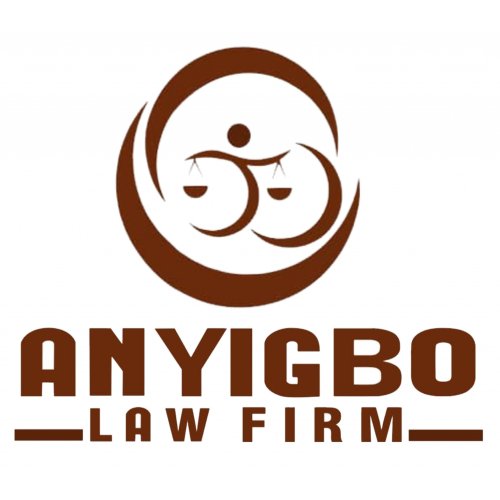Best Natural Resources Lawyers in Onitsha
Share your needs with us, get contacted by law firms.
Free. Takes 2 min.
List of the best lawyers in Onitsha, Nigeria
About Natural Resources Law in Onitsha, Nigeria
Onitsha, located in southeastern Nigeria, is a pivotal commercial hub in Anambra State. The region is characterized by its rich natural resources including land, water, and mineral reserves. Given its strategic location on the banks of the Niger River, Onitsha has a significant amount of water resources integral for both commercial and residential purposes. Moreover, Anambra State is rich in minerals such as limestone, clay, and sand which are vital for construction and manufacturing industries. The laws governing these resources in Onitsha are structured to manage their sustainable use, ensuring that the exploitation of these resources benefits the local community while preserving the environment.
Why You May Need a Lawyer
Several situations may necessitate the need for legal advice concerning natural resources in Onitsha:
- Land Disputes: Issues surrounding land ownership, distribution, and rights over land services such as farming and mining.
- Environmental Compliance: Businesses needing to adhere to environmental laws and regulations.
- Water Rights: Conflicts regarding access to and control over water resources.
- Business Permits: Obtaining legal permits and licenses for natural resource exploitation and commercial use.
- Contract Negotiations: Drafting and enforcing contracts related to the sale and use of natural resources.
Local Laws Overview
In Onitsha, natural resources law is informed by both federal statutes and local regulations. Key laws include:
- Land Use Act of 1978: Governs land ownership and usage, emphasizing state control over land allocation and use.
- Environmental Impact Assessment Act: Requires businesses to evaluate and mitigate environmental consequences of their activities.
- Water Resources Act: Regulates water use, prioritizing sustainable practices and equitable distribution.
- Mineral and Mining Act: Outlines procedures for acquiring mining rights and conducting mining operations.
Frequently Asked Questions
1. What natural resources are prominent in Onitsha?
Onitsha is known for its water resources from the Niger River and mineral deposits such as limestone and clay.
2. Do I need a permit to extract minerals in Anambra State?
Yes, you need to obtain the appropriate mining license from the Ministry of Mines and Steel Development.
3. How do I resolve a land dispute in Onitsha?
Land disputes can be resolved through negotiation, mediation, or litigation. Consulting with a lawyer can guide you through the appropriate legal process.
4. What laws govern water use in Onitsha?
The Water Resources Act governs water use, ensuring sustainable management and distribution.
5. Can foreigners own land in Onitsha?
Under the Land Use Act, land ownership by foreigners is restricted, though it can be acquired through leases granted by local authorities.
6. How are environmental laws enforced?
Compliance is monitored by the National Environmental Standards and Regulations Enforcement Agency (NESREA), and violations may result in fines or legal action.
7. What should a natural resource contract include?
A comprehensive contract should outline the terms of use, payment conditions, liability clauses, and environmental protection measures.
8. Are there any incentives for sustainable resource management?
The government offers tax incentives and grants for businesses engaging in environmentally sustainable practices.
9. Can community members participate in decision-making regarding natural resources?
Community stakeholders are often consulted, particularly in environmental impact assessments and local council meetings.
10. What is the procedure for land acquisition for commercial purposes?
Land acquisition involves applying through local government offices, ensuring compliance with zoning laws, and obtaining necessary approvals.
Additional Resources
For further assistance, consider contacting the following:
- Ministry of Mines and Steel Development: For mineral rights and mining permits.
- Anambra State Ministry of Environment: For guidelines on environmental compliance.
- Nigerian Conservation Foundation: For advocacy and resource management advice.
- Local Government Offices: For land use queries and permit applications.
Next Steps
If you need further legal assistance in natural resources, consider the following steps:
- Consult a Lawyer: Reach out to a legal professional specializing in natural resources law for personalized advice.
- Do Your Research: Review relevant federal and state laws to understand your rights and responsibilities.
- Engage Local Authorities: Work with local government offices to ensure compliance with local regulations.
- Attend Seminars: Participate in local seminars and workshops on natural resources management and legal frameworks.
Lawzana helps you find the best lawyers and law firms in Onitsha through a curated and pre-screened list of qualified legal professionals. Our platform offers rankings and detailed profiles of attorneys and law firms, allowing you to compare based on practice areas, including Natural Resources, experience, and client feedback.
Each profile includes a description of the firm's areas of practice, client reviews, team members and partners, year of establishment, spoken languages, office locations, contact information, social media presence, and any published articles or resources. Most firms on our platform speak English and are experienced in both local and international legal matters.
Get a quote from top-rated law firms in Onitsha, Nigeria — quickly, securely, and without unnecessary hassle.
Disclaimer:
The information provided on this page is for general informational purposes only and does not constitute legal advice. While we strive to ensure the accuracy and relevance of the content, legal information may change over time, and interpretations of the law can vary. You should always consult with a qualified legal professional for advice specific to your situation.
We disclaim all liability for actions taken or not taken based on the content of this page. If you believe any information is incorrect or outdated, please contact us, and we will review and update it where appropriate.












